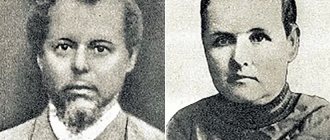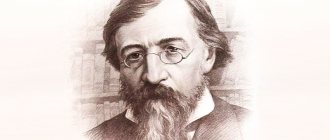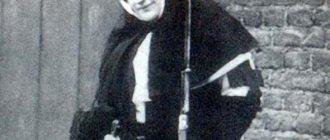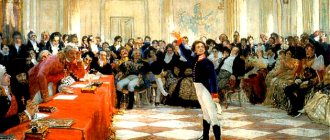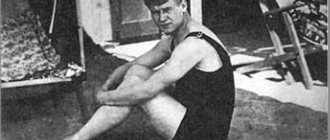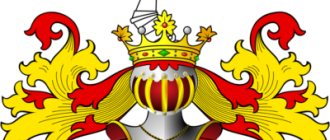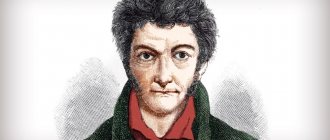Childhood and youth
The date of birth of Andrei Klimentov is considered to be August 20 (newly August 28, although some sources found the date of birth to be September 1), 1899.
The future writer was born into a working-class family in the city of Voronezh. In addition to him, his parents had 10 more children (according to other sources, eleven more children were born after him). In general, there were a lot of children in the family. Andrei was the eldest of the children, and therefore took part in raising his brothers and sisters.
Later, he also had the responsibility to take care of their material well-being. At the age of 13, Andrei had to work.
In 1920, Andrei changed his last name. He studied at a parochial school, then graduated from a city four-year school.
In 1918 he entered the Voronezh Technical School. Since there was always not enough money, he had to help his family and go to work. During his career, Platonov managed to change several professions. He had to work in many different jobs: as an assistant driver and as a foundry worker at a pipe factory. He even worked for a time as an insurer and also as a millstone worker.
Brief biography of Andrey Platonovmaterial on literature (6th grade) on the topic
Biography of Andrey Platonov
Andrei Platonovich Platonov (Klimentov) (1899 - 1951) is a Russian Soviet writer, prose writer and playwright of the 20th century, whose work is distinguished by its originality and originality.
Childhood and youth
Andrei Klimentov was born on August 20 (September 1), 1899 in Voronezh into a working-class family, in which, besides Andrei, 10 more children were born. Being the eldest son, Andrei Platonovich helps his parents in raising his brothers and sisters, and later begins to provide financially. Education in the biography of Platonov (he changed his last name in 1920) was received first at a parochial school, then at a 4-grade city school. In 1918 he began to study at the Voronezh Technical School. Due to the difficult financial situation in the family, he started working early. He changed many professions: he was an assistant driver, a pipe foundry worker at a factory, he worked in the insurance industry, and in the production of millstones.
The beginning of a literary journey
He began writing during the Civil War, as he worked as a war correspondent. This was followed by active creative activity: Andrei Platonovich Platonov showed himself as a talented writer (publicist, poet) and critic. In 1921, he published his first book, “Electrification,” and in 1922, Platonov’s book of poems, “Blue Depth,” was published, which received positive reviews from critics.
In 1923, the poet Valery Bryusov spoke positively about the collection of poems by Andrei Platonovich.
The rise of creativity and repression
After graduating from polytechnic school in 1924, Platonov worked as an electrical engineer and land reclamation specialist. Like many people of that time, the biography of Andrei Platonov is filled with idealistic revolutionary ideas. Expressing them in his works, the author eventually comes to the opposite opinion, realizing the impracticability of his plan.
In 1927-1930 Platonov writes some of his most significant works: the story “The Pit” and the novel “Chevengur”.
Then a turning point comes in Platonov’s life. After the publication of the story “For Future Use,” which was sharply criticized by Joseph Stalin, the writer’s works were refused to be published. During the Great Patriotic War, Platonov, as during the Civil War, worked as a war correspondent. Platonov's novels and war stories are being published again.
Last years of life. Death and legacy
However, the writer's literary freedom did not last long. In 1946, when Platonov’s story “Return” was published, it was again stopped being published due to excessive criticism, now forever. Probably, such events led him to ironic thoughts about the unrealizability of revolutionary ideas. The writer died on January 5, 1951 in Moscow from tuberculosis, and was buried in the Armenian cemetery.
Literary fame came to the writer after his death. As V. Vasiliev briefly noted: “The reader missed Andrei Platonov during his lifetime in order to get to know him in the 60s and rediscover him in our time.”
In memory of the writer in Voronezh, a street, a library, a gymnasium, a literary prize were named after him, and a monument was erected in his honor in the city center.
The beginning of a literary journey
Andrei began writing poetry at the age of 12, and Platonov began his writing activity during the civil war, since at that time he worked as a war correspondent. Platonov liked writing, and he began to try his hand at writing. Almost immediately, Platonov showed his talent as a publicist, poet, critic, but most importantly, as a writer.
Andrei Platonov’s first book was published in 1921 under the title “Electrification”, and the very next year a collection of his poems “Blue Depth” was published, which was immediately recognized by critics and received the best reviews.
In 1923, Andrei Platonov received high praise for his poetic creativity from Valery Bryusov.
The beginning of Platonov's creative path
During the October Revolution and subsequent events, Andrei Klimentov sided with the “Reds,” as stated in his autobiography. At first he worked as a military journalist; articles and essays were published in various revolutionary newspapers, including those with large circulations. For example, his articles were published in the Izvestia newspaper, whose circulation was one of the largest.
But in 1919, the young worker was drafted into the active army, into the railway troops. He served as an assistant driver, and then as an ordinary gunner in a specialized railway unit.
Rice. 2. Andrei Platonov in childhood After the war, Klimentov graduated from the party school, which gave him the opportunity to serve in the committee of the South-Eastern Railways. The railways were nationalized (that is, they moved from being run by private companies to being run by the state), so new governing bodies were created. His first book was published in 1921, and it was not a collection of poetry or a story.
He wrote a pamphlet called “Electrification.” And the poems were included in a collective collection, which was called “Poems”. In the same year, 1921, he married a beauty, a countess by birth, and at that time a teacher, Maria Kashintseva, and a year later a son was born, who was named Plato in honor of his grandfather. It was true love, Maria became a friend for life, although her relationship with her husband’s family was tense. These were important years for Platonov, as even a brief review of his work of this time can tell. Stories and essays continued to appear, but most importantly, the poetry collection “Blue Depth”. This book was noticed by critics, as well as by his comrades, in particular Valery Bryusov.
Rice. 3. Andrei Platonov in his youth
The rise of creativity and repression
In 1924, Platonov graduated from polytechnic school and worked as an electrical engineer and then as a land reclamation worker.
The biography of Andrey Platonov is a whole fan of idealistic revolutionary ideas. But after some time, his views change radically, the writer suddenly realizes how impossible it is for all his plans to be realized in life.
1927 - 1930 - during this time Platonov wrote his most significant works. These are the story “The Pit” and the novel “Chevengur”.
After this comes a turning point. The story “For Future Use” was criticized to smithereens by Stalin. Real persecution even began against the writer.
The editors refuse to publish Platonov's works. During the war years of the Great Patriotic War, Platonov again worked as a correspondent. At this time, he writes war stories and novellas, which are published again.
Engineer Platonov
Despite the success of his first books, Klimentov still did not intend to become a professional writer. In 1923, he became seriously involved in the electrification of agriculture in his region, as well as land reclamation. He even became the head of a department in the Provincial Land Administration.
Important! Platonov created interesting projects in the field of land hydrofication, thinking about how to get a good harvest even in dry years.
In 1924 he decided to join the Russian Communist Party (Bolsheviks). The primary organization approved his candidacy, but he never received a membership card. The engineer and writer Klimentov was greatly influenced by his meeting with Viktor Shklovsky
– a famous writer and promoter of aviation achievements. Around this time, a literary pseudonym also appeared - Klimentov turned into Platonov.
Last years of life. Death and legacy
But his works are not accepted for long. In 1946, he wrote the story “Return” and again his freedom as a writer was undermined. Again harsh criticism and a ban on publication. Now the ban on his books has been finally imposed.
In order to somehow exist, Platonov begins to write Bashkir fairy tales, which were occasionally published by some magazine editors.
On January 5, 1951, the writer dies of tuberculosis, and the biography of Andrei Platonov ends here. The writer was buried in the Armenian cemetery. A street, a gymnasium, and a library were named in his honor in Voronezh. He was awarded a literary prize and a monument was erected in the city center in honor of Andrei Platonov. And all this after the person passed away from a life in which he was never fully recognized and appreciated.
But the writer's fame did not end there. After his death and even 60 years later, his works became known and read.
Front again
When the Great Patriotic War began, Andrei Platonov again went to the front - he again became a military journalist. This time he was sent to the frontline by the Krasnaya Zvezda newspaper. At this time he also wrote several war stories. He was constantly on the front line, took part in battles several times, but was passed over for awards. He had only one award, the medal “For Victory over Germany.”
Tuberculosis made itself felt at the front, however, Platonov was demobilized from the army only in the winter of 1946.
Questions on the topic
What is Platonov's real name? Andrei Platonov's real name is Klimentov. In what city was Platonov born? The Russian Soviet writer was born in the city of Voronezh in 1899. Who were Platonov's parents? The parents were simple working people. Father (Klimentov Platon Firsovich) is a steam locomotive driver, mother (Maria Vasilievna) is the daughter of a watchmaker, a housewife. In addition to Andrey, the family had 10 sisters and brothers. What was Platonov’s education? He started studying at the age of 7. He studied first at a parochial school, then at a city 4-grade school, then at a railway school and later at a provincial party school. What was the name of Platonov's first work? The first was the brochure Electrification, written in 1921. What works of Platonov are studied in 5th grade? In grade 5, they study the story “Nikita,” which tells the story of a five-year-old boy with a strange worldview and great curiosity.
A must read!
A. Platonov “Unknown Flower”: very briefly for a reader’s diary.
Interesting Facts
- An asteroid is named after Andrei Platonov.
- The memory of the writer is preserved in his homeland - a library, a street, and a city gymnasium are named after him.
- Legends and anecdotes were created about Andrei Platonov among the Moscow creative intelligentsia, even in those years when they did not want to publish him.
Previous
BiographiesGogol biography (1809-1852) briefly the most important thing, creative path and list of famous works, family, childhood and interesting facts from the life of the writer
Next
Biographies of Lermontov (1814-1841)? biography, briefly the most important thing, the work of Mikhail Yuryevich, interesting facts from the life of the poet, list of famous works, family, parents, duel
My opinion
To be honest, I don’t remember us studying any of this writer’s works. But this is no wonder - I studied a hundred years ago. Judging by his biography, Platonov did not write many works during his life.
But one should take into account the fact that from time to time he was bombarded with criticism so much that the editors did not even accept his work for publication. With such an attitude, how could a person become famous, or at least gain some kind of popularity during his lifetime?!
Now, after I got to know Platonov a little, I decided to re-read (or, more precisely, read) some of his stories in order to understand whether there was anything to criticize his work for. After all, if his work follows the school curriculum, then there can be nothing reprehensible there.
And what do you think?
Related posts:
- What is "War and Peace" about? Summary of the novel “War and Peace” by chapters. All answers...
- Amazing stories about summer holidays It was during the summer holidays, and I want about it...
- “The Tale of Bygone Years” - the main content “The Tale of Bygone Years” - a very brief summary of the chronicle for filling out...
- I.S. Turgenev “Mumu” “Mumu” I.S. Turgenev: read the story ONLINE without registration. The work in its entirety...
